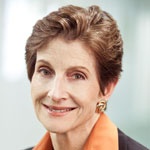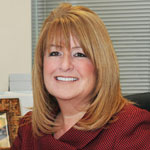
For nearly two-thirds of Oracle Corporation’s three and a half decades as a computer hardware and software powerhouse, senior vice president, general counsel, and secretary Dorian Daley has been a stable and guiding force for the Fortune 100 company. It’s Daley’s job to oversee the 300-member global legal team, focusing on litigation and policy for the Redwood City, California-based company, which is ranked 82nd on the Fortune 500, with a revenue of $37.1 billion and a worldwide workforce totaling over 115,000 in 2012.
“Advancements in technology across the whole spectrum of products and services drive evolution in the legal landscape,” Daley says. “This is exciting and challenging. I’m here because I enjoy that rapid evolution and constant change.”
Daley joined Oracle’s legal department in 1992, a few short years after the company introduced procedural language/structured query language (PL/SQL) for the Oracle relational database—an early but influential data and programming platform. By 1992, Oracle was releasing Oracle 7, which utilized PL/SQL to offer new administrative powers, application-development tools, and security features. Daley, coming off of five years at Landels, Ripley & Diamond, recognized how quickly the software world was evolving. Presented with the opportunity to work with the legal department of one of the Silicon Valley’s biggest companies, Daley saw an opportunity to not only hone her expertise, but to build her skills in the increasingly aggressive world of the Silicon Valley information wars.
Like many successful legal professionals, early in her career, Daley was resistant to the idea of becoming a lawyer. Graduating early from her undergraduate track at Stanford in 1981, Daley found full-time work as a legal assistant for Mary Cranston at Pillsbury, Madison & Sutro (now Pillsbury Winthrop Shaw Pittman). Cranston later went on to become the chairman of the firm, and was the first female chairman of a firm that size in the United States. Cranston, an inspiration to Daley, encouraged her to consider law school. “Mary got me very involved in a large, multidistrict litigation case, and she gave me really interesting and exciting work,” Daley says. “I soon realized that I should go to law school and do this thing right.”
Daley graduated from Santa Clara University School of Law in 1986, and, after taking time off to travel through Micronesia and East Asia, she returned to California where she became an associate at Landels, Ripley & Diamond, a midsize legal firm. As a first-year associate at this democratically managed firm, she served on the management committee. “I was with Landels for about five years, but toward the end of that time, the nature of the firm began to change,” Daley says. “A friend of mine suggested I look for an in-house position, because, although I am a litigator, I actually like to resolve problems. I also like the complicated issues that large companies often have. I saw an opening at Oracle in a local legal publication and decided to go for it.”
The energy in the air at Oracle and the greater Silicon Valley area in 1992 set the stage for exactly the kind of challenge Daley was seeking when she started with the company that January. “It was an exciting time in the technology sector,” she says. “I have worked in other kinds of complex litigation, but I find the legal issues in the technology sector more rewarding. It has given me the opportunity to learn something that is evolving constantly.”
In terms of revenue, after Microsoft and IBM, Oracle is the third-largest software maker in the world. It’s not only a key player in Silicon Valley, but is a major driver in the greater technological universe. Holding this position requires acute sensitivity to the mimetic relationship between technological innovation and legal politicking, and Daley’s inveterate experience in the Valley has led to some of the brightest highlights of her career at Oracle, including the $10.3 billion PeopleSoft acquisition, in 2004, and the estimated $7 billion Sun Microsoft acquisition, in 2010. “These were some of the most exciting things I’ve participated in at Oracle,” Daley says. “They were huge for the industry and game changers for Oracle.”
Definitive of the technology sector, corporate growth can be attributed as much to mergers and acquisitions as it can to the defense of patents, copyrights, and intellectual property. Most recently, Daley was one of the key strategists behind Oracle’s suit against SAP AG in 2010, in which Oracle claimed SAP was illegally downloading and copying Oracle software. SAP was then using these bootlegged capabilities to cut into Oracle’s customer base, and, when pinned with the infringement—with Oracle claiming $1.6 billion in damages—SAP, rather than denying liability, instead claimed that the damages should fit the crime, and proposed to instead pay $40 million.
After intense litigation, spearheaded by Daley, the jury—in one of the largest jury verdicts in US legal history—ruled in favor of Oracle, requiring SAP to pay Oracle $1.3 billion in damages—a big victory for Daley and Oracle, but also just one part of the job. “In terms of my professional time, I’m very much focused on my work at Oracle,” Daley says. “I have to understand the intricacies of the business, but my job is to provide legal advice and build out an infrastructure to support management and protect the company and its shareholders.”
—Dorian Daley
Daley is a member of the prestigious Association of General Counsel, and continues to be involved at Santa Clara University School of Law. “I’m grateful for that institution and what it did for me,” Daley says, though she’s as quick to look at what’s on the horizon. “Looking forward, there is a great deal to be excited about at Oracle. The effort to broaden our product portfolio and the services attendant to that has really driven us toward being the most important technology company in the world, which is our goal.”

